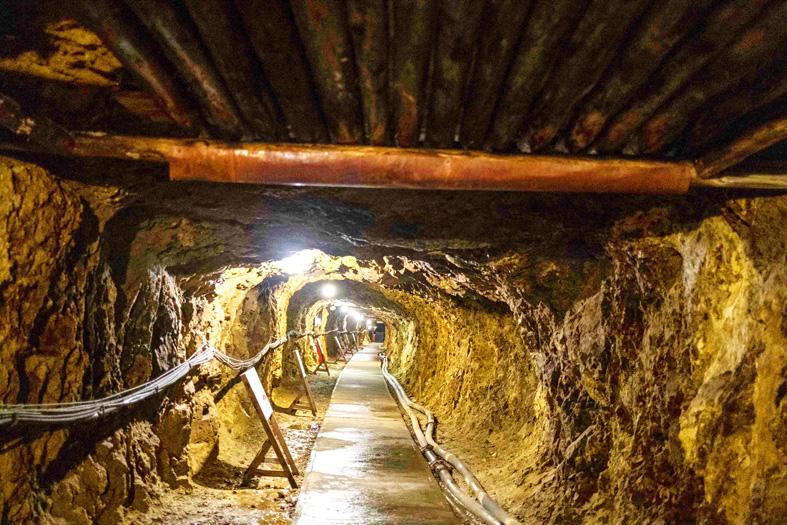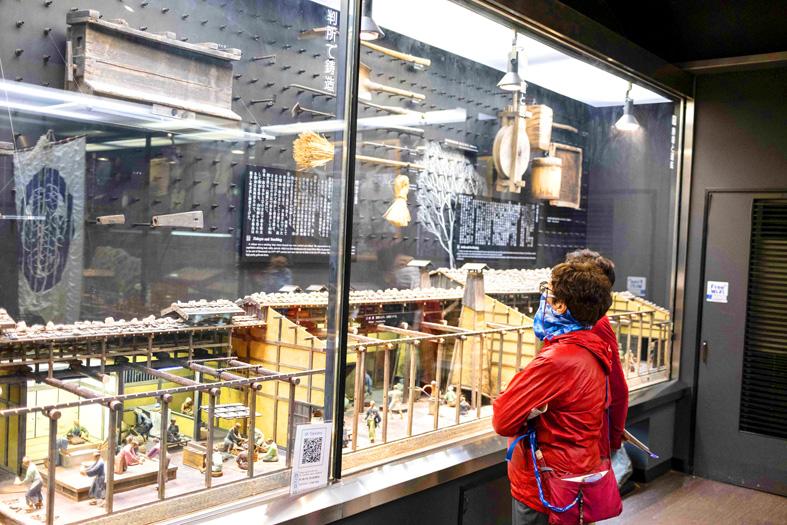Under a split-top mountain on the Japanese island of Sado lies a network of centuries-old mines that have sparked a new diplomatic row with South Korea.
Some of the gold and silver mines of Sado, off Japan’s west coast, are believed to have started operating as early as the 12th century and produced until after World War II.
Japan believes that lengthy history and the artisanal mining techniques used there at a time when European mines had turned to mechanization merit recognition on UNESCO’s World Heritage List.

Photo: AFP
However, in Seoul, the focus is on what is not mentioned in the bid: the use of conscripted Korean labor during World War II, when Japan occupied the Korean Peninsula.
Japan is seeking recognition of three sites — the Nishimikawa gold mine, the Tsurushi silver mine, and the Aikawa gold and silver mines — from 1603 to 1867.
Officials and supporters of the bid say that era was when the mines were the world’s most productive and mining was done by hand.

Photo: AFP
However, it also stops short of the period when conscripted Koreans toiled in conditions that even some backers of the UNESCO bid call “extremely harsh.”
The World Heritage effort has been years in the making, inspired in part by the successful recognition of a silver mine in western Japan’s Shimane region.
Ryo Usami, from Sado City’s World Heritage Promotion section, said locals hoped the recognition would highlight the mine’s contributions to the unique culture and history of the island.
“Many people migrated to Sado to mine gold and silver... They came from all over Japan and brought their local cultures,” Usami said.
“Sado’s history is basically the history of these gold mines, and its culture formed in part thanks to the mining operations. That’s what Sado city wants to preserve,” he said.
Production at the sites petered out by the 1960s, when mine operator Mitsubishi Materials began accepting tourists.
In the 1970s, animatronic robots were installed in some mining tunnels to give a sense of what life there was like.
The eerie, rundown figures remain, their heads swivelling side-to-side and arms mechanically swinging pickaxes up and down in a forlorn fashion.
Groups of domestic tourists file through the frigid tunnels and read panels that explain the history of Sado’s mining industry.
The panels note that Edo-era miners were often homeless or unregistered people who were captured and forced to work, and that child labor was used at times.
However, there is little to testify that an estimated 1,500 Koreans worked at the sites during the war.
Their status is disputed, with some saying about two-thirds signed contracts voluntarily, while the remainder were conscripted during war-time mobilization.
“The working conditions were extremely harsh, nevertheless the pay was very high, that’s why lots of people, including many Japanese, applied,” said Koichiro Matsuura, a former UNESCO director-general who is backing Sado’s bid.
Others say the recruitment conditions effectively amounted to forced labor, and that Korean workers faced significantly harsher conditions than their Japanese counterparts.
“Discrimination did exist,” said Toyomi Asano, a professor of history of Japanese politics at Tokyo’s Waseda University.
“Their working conditions were very bad and dangerous. The most dangerous jobs were allocated to them,” he added.
Wartime issues like forced labor have soured ties between Japan and South Korea, and Seoul has formed a task force to push back against the UNESCO bid.
After the bid was announced, the government summoned Tokyo’s ambassador and issued a statement saying it “strongly regrets” the nomination and “sternly urges Japan to stop its attempt.”
The issue of forced labor affects other Japanese heritage sites, including the “Sites of the Meiji Industrial Revolution” inscribed in 2015.
UNESCO last year demanded an information center for the sites properly explain that a “large number of Koreans and others [were] brought against their will and forced to work under harsh conditions.”
Matsuura believes Japan must “avoid making the same mistake” at Sado.
“We must say in a more concrete and more honest manner how the Korean workers lived and worked at the Sado gold mines.”
It is a view shared by some visitors, including 79-year-old Hideji Yamagami.
“Of course they should [explain]; I didn’t know about it at all,” he said after a trip through the Aikawa site.
“I thought it was Japanese who had done all the hard work,” he said.
Asano hopes UNESCO will insist the full history of Sado’s mines is on display if the site gets World Heritage status, and believes Japan “should not fear” recognizing a part of its history.
“Every nation has its dark history, those nations who are completely exempt do not exist,” he said.

Airlines in Australia, Hong Kong, India, Malaysia and Singapore yesterday canceled flights to and from the Indonesian island of Bali, after a nearby volcano catapulted an ash tower into the sky. Australia’s Jetstar, Qantas and Virgin Australia all grounded flights after Mount Lewotobi Laki-Laki on Flores island spewed a 9km tower a day earlier. Malaysia Airlines, AirAsia, India’s IndiGo and Singapore’s Scoot also listed flights as canceled. “Volcanic ash poses a significant threat to safe operations of the aircraft in the vicinity of volcanic clouds,” AirAsia said as it announced several cancelations. Multiple eruptions from the 1,703m twin-peaked volcano in

A plane bringing Israeli soccer supporters home from Amsterdam landed at Israel’s Ben Gurion airport on Friday after a night of violence that Israeli and Dutch officials condemned as “anti-Semitic.” Dutch police said 62 arrests were made in connection with the violence, which erupted after a UEFA Europa League soccer tie between Amsterdam club Ajax and Maccabi Tel Aviv. Israeli flag carrier El Al said it was sending six planes to the Netherlands to bring the fans home, after the first flight carrying evacuees landed on Friday afternoon, the Israeli Airports Authority said. Israeli Prime Minister Benjamin Netanyahu also ordered

Former US House of Representatives speaker Nancy Pelosi said if US President Joe Biden had ended his re-election bid sooner, the Democratic Party could have held a competitive nominating process to choose his replacement. “Had the president gotten out sooner, there may have been other candidates in the race,” Pelosi said in an interview on Thursday published by the New York Times the next day. “The anticipation was that, if the president were to step aside, that there would be an open primary,” she said. Pelosi said she thought the Democratic candidate, US Vice President Kamala Harris, “would have done

Farmer Liu Bingyong used to make a tidy profit selling milk but is now leaking cash — hit by a dairy sector crisis that embodies several of China’s economic woes. Milk is not a traditional mainstay of Chinese diets, but the Chinese government has long pushed people to drink more, citing its health benefits. The country has expanded its dairy production capacity and imported vast numbers of cattle in recent years as Beijing pursues food self-sufficiency. However, chronically low consumption has left the market sloshing with unwanted milk — driving down prices and pushing farmers to the brink — while